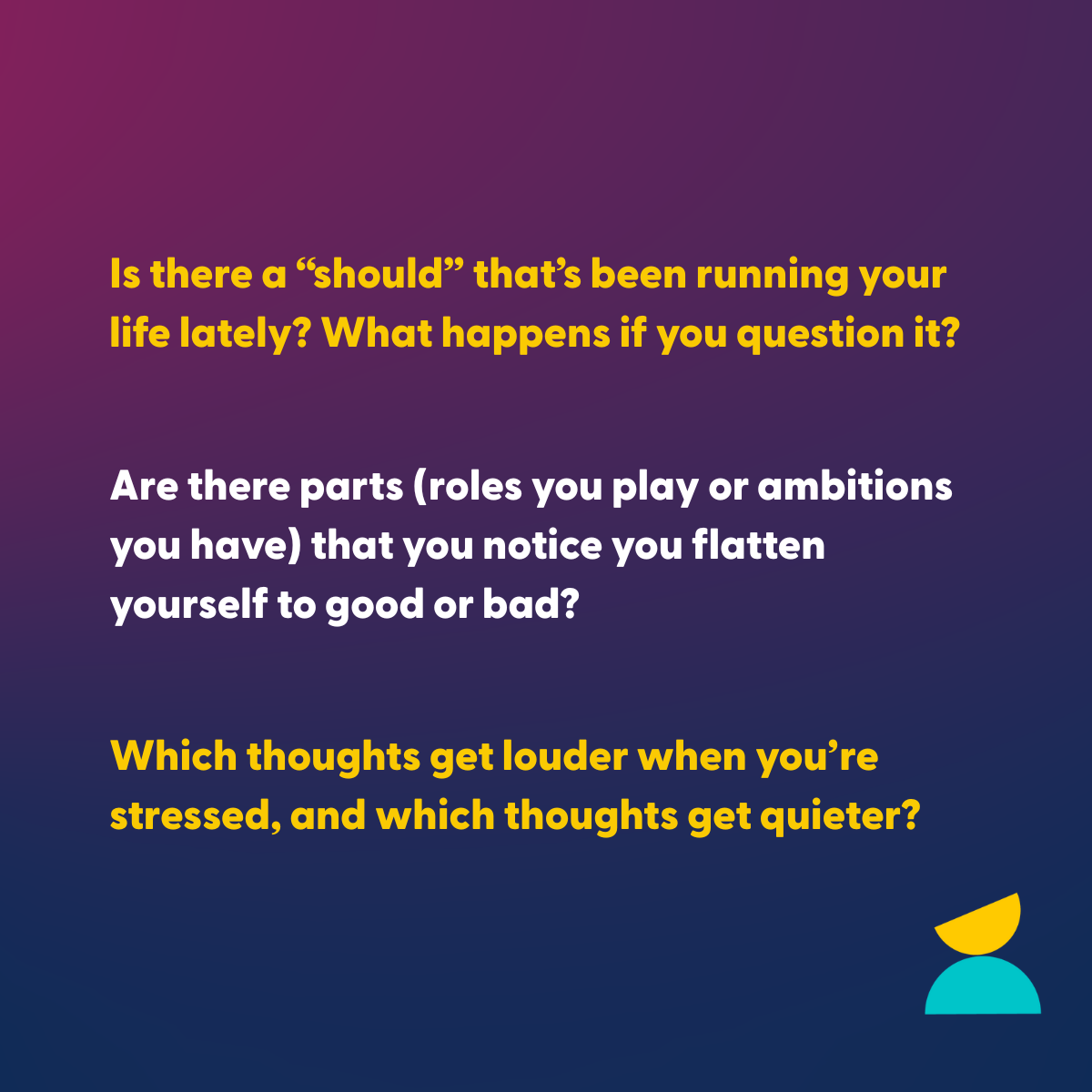Unbothered (enough)
Finding clarity and compassion for all the different parts of you
Last night I lay in bed watching the sunset, entertained and calmed by the flickers of orange shining through the leaves. I thought about how grateful I was, to be able to enjoy the consistent, reliable, unrushed routine of the sun. I also thought about how it was made possible, because I was unbothered … enough.
Let me tell you how I think I got there, starting with a couple ideas that sit at the very center of all the work I do:
(1) There are lots of different parts of you.* These parts exist inside of you at the very same time.
Your parts can be relational (parent, sibling, child, grandchild, friend, neighbour, acquaintance). They can be dispositional (introvert, morning person, life of the party). They can also be rooted in preferences (hot not cold, books not shows, dogs over cats).
Our parts can be programmed by societal norms and systems. Think grind culture. Respect for morning people, derision of night owls. Think “work hard, play later.” Here grows the seeds sown by patriarchy, white supremacy, heteronormativity, and all the systems that caste people into different categories of worth and value.
Finally, our parts can be trained by our developmental experiences. Just notice your inner dialogue and images that come to mind when I say this one word: Lazy.* Can you see your parent refusing to sit down? Or making a big deal because you were sitting down? What did they sacrifice for your success, and how did little you internalize a sense of connection and worth around work, as a result.
These parts exist inside of you, with more and less clarity, complimenting, overlapping, and undermining one another, at the very same time.
(2) All of the parts of you belong.
They all do. It’s just that simple. There are no good or bad parts.*** No right or wrong parts. There are parts that have had more and less comfortable needs to meet, roles to play, or jobs to do for you (in the past or present), but it is fair to say that every part of you makes sense, and is worthy of care.
(3) As humans, very rarely (if ever), are all of the different parts of you satisfied at the same time.
We are told if we juice cleanse hard enough, get thin enough, make enough money, have enough friends, defy aging, get the bespoke mug, drink the best latte, earn the most prestige… that we will have arrived and finally be satisfied. It’s simply not true. We contain multitudes that contradict**** and conflict, and that means we have to be clear, deliberate and compassionate: which parts are involved, what is the present context and my priority, and how do I handle my disappointment and elation?
(4) In other words, lots of the time, you have to choose between different parts of yourself.
The choice can be easy. For example, I will choose to sleep in and let my partner get up with the baby: the body part is satisfied, the parent part maybe misses the time with their baby, the partner part grateful). It can go across the spectrum, all the way to ruthless: choosing to live away from family (the part that wants to live close to family withers, to satisfy the part that is ambitious), or to end a long term relationship, to leave the parent to your kids, to start a new job, to try a new treatment, and on and on.
Prioritizing the different parts of us can be heart breaking.
So why do it? Why not try and get it all done? Or simply just let the chips fall where they may? My bet is, those strategies are too bothersome - to full of fear, and worry, and pain. To anxiety ridden, and unsatisfying.
It’s why you’re here, trying to make sense together.
All of this leads back to my slow study of the sunset, and my sense of being unbothered enough to enjoy the unrushed passage of time. Not feeling pressed to sleep, pressured to organize, guilted into trouble shooting or hypothetical rehearsing.
What if being unbothered (enough) is simply a matter of clarity and compassion as between all of our parts, an inner agreement that holds each part dear and still see only some to fruition and expression.
I had things to do, I’ve also spent the last two decades getting really clear about all of the different parts of me. Which are present, which needs I need to prioritize, how to do so, when, where, and on and on.
It’s the work of a lifetime, the work of becoming who you are.
I wonder if you are clear about all of the different parts of you that wake up every day, that exist inside, clamouring, harmonizing, and clashing within … simply for your notice.
Are you aware of your multitudes?
Perhaps more presciently, are you choosing based on what you know to be true and original to you … or are you moving from the training and conditioning you received growing up?
Some keys, to help identify programming and conditioning:
“Should” - anything that comes with a “should” can be explored: according to whom? For what purpose? Where did you learn that you “should” do x?
Is there a “should” that’s been running your life lately? What happens if you question it?
Pay attention to any places in your life, that matter so much to you, that you flatten your identity to good/bad? Programs often intermingle with what matters most to you, coopting your values. Anytime your identity is flattened to the point that you are reaching to be “good” or “not bad.” For example, when asked, why this part you answer “I want to be a good parent.” Concrete ideas like good and bad lack nuance and are very young, meaning they indicate the presence of learned beliefs, responses and behaviours as opposed to your original preferences and desires. Are there parts (roles you play or ambitions you have) that you notice you flatten yourself to good or bad?
The more stressed you are, the louder the programming gets (less choice you feel like you have). Which thoughts get louder when you’re stressed, and which thoughts get quieter?
The question isn’t whether you’ve been programmed and conditioned. You have. We all have. It’s not about being unbothered, its about owning what bothers me and what doesn’t, consistently, like the rising and setting sun.
As always, be gentle out there, on yourselves and one another other.
*Parts work is an multidisciplinary idea, that you see in everything from Gestalt therapy to Internal Family Systems (IFS, created by Dr. Richard Schwartz). I am trained in Anchored Relational Therapy, and owe my thinking here to Dr. Phyllis Solon, Patti Mayer and Chuck Benincasa. There’s an awesome new book rooted in the IFS model though, by Britt Frank called Align Your Mind if you want an easy primer: Frank, B. (2025). Align your mind: Tame your inner critic and make peace with your shadow using the power of parts work. TarcherPerigee.
**I love this book by fellow Substacker and PhD, Devon Price: Price, D. (2021). Laziness does not exist. Atria Books.
***I don’t, for this very reason, love the “demolish your inner gremlin” branding that’s taken ahold in our day to day rhetoric. There’s no monsters within, even when certain parts want things the other find abhorrent. It’s a matter of seeing clearly how each part learned to serve a function, to meet a need, and them sorting through how to make sense of their continued presence given your present values and context. Dr. Becky Kennedy does a lovely job of making all this parts work clear in the context of parenting. Her work, it’s of note, is IFS driven.
***Nod to Walt Witman, who famously wrote: “Do I contradict myself? Very well then I contradict myself, (I am large, I contain multitudes.)” Whitman, W. (1855/2007). Song of myself. In Leaves of grass (D. S. Reynolds, Ed., pp. 27–87). Oxford University Press. (Original work published 1855)




